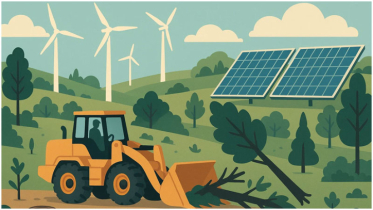Unlocking sustainable economic growth

Sustainable economic growth (SEG) is not just a supercilious goal but an ultimate necessity in today's world. SEG incorporates not only economic prosperity but also social equity and environmental safeguarding. In this rapidly changing world, sustainable economic growth is indispensable for warranting the well-being of current and forthcoming generations. Its significance lies in several key areas:
First, SEG prioritizes environmental safeguarding by promoting resource efficiency, reducing emissions, and mitigating climate change impacts. In this way SEG ensures that economic progress does not come at the expense of the planet's health and resilience. Thus, SEG through environmental stewardship is critical for safeguarding natural resources and ecosystems for future generations.
Second, SEG aims to foster social equity by reducing poverty, inequality, and exclusion. SEG seeks to ensure the distribution of wealth and opportunities more equitably, guaranteeing that the benefits of growth are shared among all parts of society. SEG contributes to social cohesion and stability by addressing social disparities and promoting inclusive development.
Third, SEG promotes long-term stability by enhancing resilience, diversification, and innovation. SEG reduces vulnerability to external shocks, such as economic downturns or natural disasters, and fosters adaptive capacity to navigate uncertain times (Cohen et al, 2021). SEG lays the foundation for enduring prosperity by promoting a more robust and sustainable economic system.
Now, let's explore how specific factors with inclusive approach such as FinTech lending, digital financial inclusion, and addressing energy poverty contribute to SEG:
FinTech lending plays a crucial role in expanding access to finance, particularly for underserved populations such as small businesses and individuals without traditional banking access. FinTech lending stimulates entrepreneurship, promotes investment, and fosters economic activity by leveraging technology to streamline lending processes, reduce costs, and expand credit availability (Rahman, 2024). In emerging markets and rural areas, where traditional banking infrastructure may be lacking, FinTech lending can unlock new opportunities for economic growth and development.
Digital financial inclusion, enabled by technology and innovative financial services, extends access to banking, payments, savings, and insurance to marginalized communities (Rahman, 2024). digital financial inclusion enhances productivity, facilitates economic transactions, and promotes financial resilience by empowering individuals and businesses with financial tools and services. Through mobile banking, digital payments, and other digital channels, individuals can access financial services conveniently and affordably, reducing barriers to financial inclusion and promoting economic empowerment.
Energy poverty, characterized by limited access to reliable and affordable energy services, poses a significant barrier to economic development (Rahman, 2024). Addressing energy poverty through investments in energy infrastructure, renewable energy technologies, and energy efficiency measures is essential for improving living standards, enhancing productivity, and unlocking new opportunities for economic growth. In rural and underserved areas, where energy access may be limited, investing in energy infrastructure can spur economic activity, create jobs, and improve quality of life.
The moderating role of energy poverty is crucial in this context. Energy poverty exacerbates economic vulnerabilities and limits the effectiveness of financial inclusion and FinTech lending initiatives. By addressing energy poverty and improving access to reliable and affordable energy services, policymakers can create an enabling environment for sustainable economic growth (Rahman, 2024). Investments in energy infrastructure, renewable energy technologies, and energy efficiency measures are essential for unlocking the full potential of financial inclusion and FinTech solutions in driving economic development. High access to electricity is revealed to alleviate energy poverty, thereby amplifying the positive impact of financial inclusion and FinTech lending on economic growth. Conversely, regions with limited access to electricity face hurdles in realizing the full potential of financial inclusion and FinTech lending in driving economic development (Rahman, 2024).
Thus, the following recommendations can be offered:
* Integrated policies: To effectively drive sustainable economic growth, it's crucial for policymakers to adopt integrated policy frameworks. These frameworks should prioritize sustainable development and incorporate measures aimed at addressing various interconnected challenges (Rahman, 2024). By placing emphasis on tackling energy poverty, promoting financial inclusion, and harnessing FinTech innovation, policymakers can create synergies that amplify the impact of their initiatives.
* Investment in infrastructure: One of the cornerstones of sustainable economic growth is investment in infrastructure, particularly in the energy sector. Governments and other stakeholders must allocate resources towards building robust energy infrastructure including electrification projects, renewable energy deployment and energy efficiency initiatives (Rahman, 2024). This investment is particularly critical in rural and remote areas where access to reliable energy services is limited, as it can significantly improve energy access and reliability, thus laying the foundation for economic development.
* Promote innovation: Innovation plays a pivotal role in addressing complex challenges such as energy poverty and financial exclusion. Governments, financial institutions, technology providers, and civil society must collaborate to foster innovation in these areas. By encouraging the development and deployment of scalable solutions, stakeholders can unlock new opportunities for addressing energy poverty and expanding financial inclusion through digital channels (Rahman, 2024). This collaborative approach to innovation is essential for driving sustainable economic growth in a rapidly evolving global landscape.
* Capacity building: Investing in human capital development is key to unlocking the full potential of individuals and communities in driving sustainable economic growth. Governments should prioritize investments in education, skills training, and capacity-building initiatives to enhance financial literacy, digital literacy, and entrepreneurship (Rahman, 2024). By empowering individuals with the knowledge and skills needed to navigate financial systems and leverage energy resources effectively, policymakers can foster a culture of entrepreneurship and innovation that contributes to long-term economic prosperity.
In conclusion, unlocking sustainable economic growth requires an inclusive approach that integrates financial inclusion, FinTech innovation, and energy access initiatives. By addressing energy poverty and enhancing financial inclusion through digital channels, countries can create opportunities for inclusive and resilient economic development, laying the foundation for a more prosperous and sustainable future for all.
Writer: Md Mominur Rahman, a Research Associate, BIGM, University of Dhaka (Affiliated).
Source: Dhaka Tribune.
.png)




